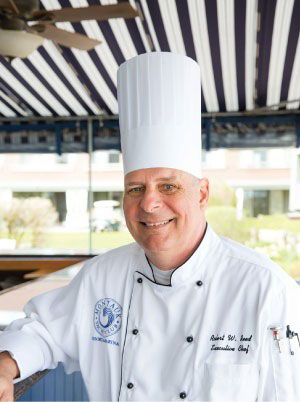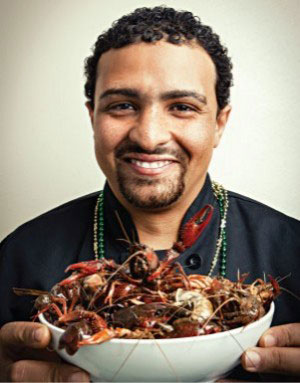
Copyright Long Island Pulse Magazine
Robert Reed runs the kitchens at the Montauk Yacht Club Resort and Marina, using his attention to detail to create edible wonders.
By Lee Landor
[Note: This article and its accompanying photos originally appeared in the June 2014 issue of Long Island Pulse Magazine. This content is the rightful property of Long Island Pulse Magazine.]
Robert Reed’s love of the paring knife is telling. The head chef has a way of always carrying the short, sharp blade around the kitchen of the Montauk Yacht Club Resort & Marina. The knife’s specialty is painstaking, detailed work, even when wielded by someone responsible for feeding a hundred guests at once on any given summer weekend.
Sure, prepping live Maine lobster, striped bass and mussels doesn’t call for a paring knife, but there’s still plenty of use for Reed’s favorite tool. He digs its tip into the white flesh of a radish, carving it into an elegant rose. He uses it to shape seven-sided chateau potatoes that await tourné-ing. Or sometimes, just to clean crabs. “The food, at the end of the day, is the art,” Reed said. “It’s the reason I’m in this business. If it wasn’t for my passion for being in the kitchen and mentoring the staff and teaching the kids out of college, this job wouldn’t be any fun and I’d be working at the bank.”
Life in a cubical, shuffling paperwork is hard to imagine for someone like Reed. Growing up on the shores of Chicago’s Lake Michigan he took advantage of the proximity to water: Fishing, snorkeling, reef diving and riding a scooter along the picturesque roads. And while he still casts a line from time to time, the scooter has been upgraded. Reed zips across Montauk Highway’s untouched vistas on an electric-blue Honda Nighthawk 750 motorcycle. “No matter how tough my day’s been in the kitchen,” Reed said, “no matter how many hours I’ve worked, a nice ride home on the motorcycle with the wind in my face and the sound of the machine—by the time I get home, I’ve forgotten everything that’s happened.”
Classically trained in and expressly fond of French cuisine, Reed adheres rigidly to what he picked up in culinary school in San Francisco. Convivial Julia Child aside, French cooks are fanatics about the processes in the kitchen. After all, French cuisine “is the mother of all cuisines,” Reed said. “It’s the vehicle from which all other forms of culinary expression grow.” Reed’s training also explains his purist palate and preference for clean dishes like duck confit and rabbit ragù, where natural flavors are enhanced, not masked, by spices, sauces and seasonings.
Reed is not just the big-picture guy who manages the kitchens, schedules and staff. He’s also the garde manger, prep cook and expediter; he gets his hands dirty working the line, shoulder-to-shoulder with the staff. “I’m trying to bring the human element to the kitchen,” he said. “Liveliness.” And that sentiment is not reserved for the interactions with his cooks. It’s also what he feels when he reaches into the refrigerator for a lobster. “They’re alive. How many times can you actually reach into the refrigerator and grab something that’s still alive?”
Reed’s fondness for the ocean has taken him from the shores of San Diego to the island of St. Maarten. Now living a stone’s throw from the water in Montauk, Reed is exploring local bays while boating, scuba diving and water skiing. “The smells, the birds and the people that the ocean draws—it’s the best,” Reed said. “The sea will change your life.” And while the paring knife is used for detail work, working near the waters off Montauk Point might just be the most important detail of all for Reed.
